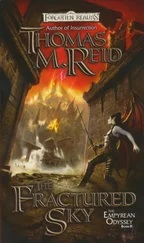“You are, presumably, speaking of a time in my future. I have no knowledge of the specifics of the future.”
“Where is your spare wand?” She hoped she wouldn’t have to take matters into her own hands. But she planned to, as he’d taught her, assume the worst and prepare accordingly .
“In a box in my tea cabinet, the same box I asked you to pass to me before our first session in the Crucible. It will open only at your touch—or mine. Password: Sleeping Beauty. Countersign: Nil desperandum .”
“In an emergency, what should I take from your room other than the Crucible and the spare wand?”
“My mother’s diary, currently disguised as Lexikon der Klassischen Altertumskunde . Password: Better by innocence than by eloquence. Countersign: Consequitur quodcunque petit .
She asked him to repeat all the passwords and countersigns and committed them to memory.
Back in his room, she’d just found his spare wand when Mrs. Hancock called, “Lights off, gentlemen, lights off.”
He’d told her not to worry about lights-out, but she needed a plan, in case his went awry. She could imitate the prince’s voice and then, hoping Mrs. Hancock bought her imitation, turn off the lights, step out, and enter her own room before Mrs. Hancock’s eyes.
Except she wasn’t much of a mimic.
The knock came at the prince’s door. Before Iolanthe could make a sound from her suddenly parched throat, the prince’s voice rang out. “Good night.”
Her heart almost leaped out of her mouth. She spun around. He had not come back. She couldn’t be entirely sure, but the stone bust he kept on his shelf appeared to have answered for him.
“Won’t you turn off your lights, Your Highness?” asked Mrs. Hancock as Iolanthe shoved the wand up her sleeve and grabbed the Crucible and Lexikon der Klassischen Altertumskunde from his desk.
The gas lamp went out by itself. Iolanthe opened the door just enough to let herself out.
“I will be turning my lights off right away also, ma’am,” she said to Mrs. Hancock, smiling.
“See that you do, Fairfax. Good night.”
“Good night, ma’am.”
Her heart still pounding, she turned off the lights in her room, drew the curtain, summoned a smidgeon of fire, and set it in the depression of a candleholder. Sitting down on her bed, she opened the diary first: she’d quickly know whether it had anything to tell her.
What she found terrified—and enraged—her. His mother specifically mentioned Atlantean soldiers and the presence of Lady Callista, known agent of Atlantis. And he’d taken off without so much as a word to her. It was almost as if he wanted to march to his doom.
She stormed into his classroom in the teaching cantos and tersely repeated the answers to the questions meant to ascertain her identity.
“If I need to go to the Citadel, right now, and I have no other means of transportation, what should I do?”
His record-and-likeness frowned. “No other means of mobility at all?”
“None. I am in a no-vaulting zone. And I have no vehicles, flying carpets, beasts of burden, or portals.”
“And you absolutely must go?”
“Absolutely.”
“You may use the Crucible as a portal, but only if it is a matter of life and death, and only after you have exhausted all other options.”
“You told me the Crucible is not a portal.”
“I said it is not used as one. And with good reason. To use the Crucible as a portal requires that a mage physically inhabit the geography of the Crucible. When you get hurt, you get hurt. When you are killed, you die. It is doable, but I advise strenuously against it.”
She wanted to yank him off his swing and shake him. “If you advise strenuously against it, why have you done it yourself, you nitwit?”
He was perfectly unruffled. “I do not believe I have prepared for that question. Rephrase or ask a different one.”
She forced herself to calm down. “Tell me how the Crucible works as a portal.”
“It serves as an entrance into other copies of the Crucible. There were four copies made. One I keep with me at all times, one is at the monastery in the Labyrinthine Mountains, one in the library at the Citadel, and the fourth has been lost.”
“So you enter this copy of the Crucible, say a password, and you are whisked inside the copy of the Crucible at the Citadel. Then you just say ‘And they lived happily ever after’ and you are standing in the Citadel itself?”
“I wish it were that simple. When Hesperia turned the copies of the Crucible into portals, she tried to make safe passages, but a great deal of the original structure could not be overridden.
“The story locales of the Crucible are normally each instantly accessible, like drawers in a chest. But when the Crucible is used as a portal, the locales join into one continuous terrain. Only one point of entry and exit exists at the center of this terrain, on the meadow not far from Sleeping Beauty’s castle. To reach any other spot, you must travel, on foot, on beasts of burden, or via magical means, as long as those means were known at the time of the Crucible’s creation—which means no vaulting.
“To make matters worse, Hesperia, concerned that pursuers might follow her into the Crucible, located the actual portals in some of the most dangerous places in the Crucible: Briga’s Chasm, Forbidden Island, and Black Bastion.”
Black Bastion, where he’d been killed by Helgira’s lightning.
“Which one goes to the Citadel?”
“Black Bastion.”
Well, of course . “The whole of Black Bastion or a specific place inside?”
“The prayer alcove inside Helgira’s bedchamber.”
She already felt nauseous. “How do I get to Black Bastion?”
“The map at the very front of the Crucible should tell you the layout of the land when it is used as a portal. From Sleeping Beauty’s castle, Black Bastion is about thirty-five miles north-northeast.”
She rubbed her throat. The collar of her shirt was suddenly too restrictive. “All right, give me the password and the countersign to using the Crucible as a portal.”
He gave both, but added, “You must swear to me, on your guardian’s life, that you will not use the Crucible this way unless you yourself are in mortal danger.”
She hesitated.
He rose and took her hands. His own, calloused from countless hours on the river, were warm and strong. “I beg you, do not, do not put your life in danger, particularly not for me. I will never forgive myself. The only thing that makes this entire madness bearable is the hope that you may yet survive, that one day you may live the life you have always wanted.”
Tears stung the back of her eyes. She looked away and said, “And they lived happily ever after.”
Titus shook. He cursed himself, but the shaking would not stop.
He had been twelve, cocky about his prowess in the Crucible after having vanquished the Monster of Belle Terre, the Keeper of Toro Tower, and the Seven-Headed Hydra of Dread Lake. His death at Helgira’s hand had obliterated any further thoughts of invincibility. In fact, it had been two months before he could use the Crucible again, and even then only to partake in the easiest, simplest quests.
In the years since, he had conquered his fear of the Crucible, but never his terror of Black Bastion.
The wyvern beneath him sensed his growing panic and decided to take advantage. It rolled and plunged, attempting to shake him loose. Practically joyous for the distraction, he jabbed his wand into the beast’s neck. It screeched in pain.
“Fly properly or I will do it again.”
Last time his approach had been blatant, at the forefront of a mob of attackers. He would not repeat that mistake. Helgira’s saga began with one of her lieutenants arriving at Black Bastion on a wyvern. Titus had wrangled a wyvern from Sleeping Beauty’s castle and would try to pass himself off as a soldier coming to warn Helgira of an impending attack.
Читать дальше












